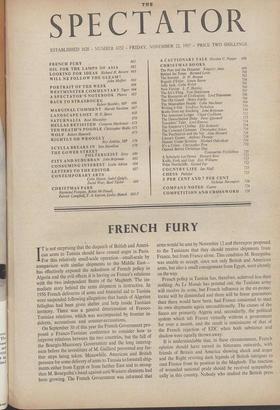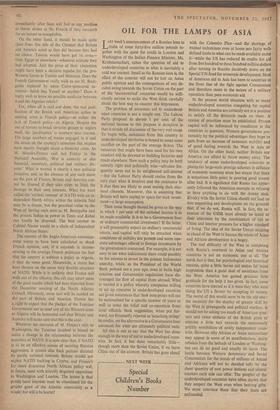FRENCH FURY
IT is not surprising that the dispatch of British and Ameri- can arms to Tunisia should have caused anger in. Paris. For this relatively small-scale operation—small-scale by comparison with similar shipments to the Middle East— has effectively exposed the nakedness of French policy in Algeria and the evil effects it is having on France's relations with the two independent States of the Maghreb. The im- mediate story behind the arms shipment is instructive. In 1956 French deliveries of arms and financial aid to Tunisia were suspended following allegations that bands of Algerian fellaghas had been given shelter and help inside Tunisian territory. There was a general deterioration of Franco- Tunisian relations, which was accompanied by frontier in- cidents,' accusations and counter-accusations, On September 30 of this year the French Government pro- posed a Franco-Tunisian conference to consider how to improve relations between the two countries, but the fall of the Bourges-Maunoury Government and the long interreg- num before the investiture of M. Gaillard prevented any fur- ther steps being taken. Meanwhile, American and British pressure for some delivery of arms to Tunisia to forestall ship- ments either from Egypt or from further East and to streng- then M. Bourguiba's hand against anti-Western elements had been growing. The French Government was informed that arms would be sent by November 12 and thereupon proposed to the Tunisians that they should receive shipments from France, but from France alone. This condition M. Bourguiba was unable to accept, since not only British and American arms, but also a small consignment from Egypt, were already on the way.
French policy in Tunisia has, therefore, achieved less than nothing. As Le Monde has pointed out, the Tunisian army will receive its arms, but French influence in the ex-protec- torate will be diminished and there will be fewer guarantees than there would have been, had France consented to start its own shipments again unconditionally. The causes of the fiasco are primarily Algeria and, secondarily, the political system which left France virtually without a government for over a month, and the result is reminiscent of that of the French rejection of EDC when both substance and shadow were equally thrown away.
It is understandable that, in these circumstances, French opinion should have turned its bitterness outwards, with friends of Britain and America showing shock and anger and the Right reviving dark legends of British intrigues to oust France from its position in the Maghreb. The reaction of wounded national pride should be received sympatheti- cally in this country. Nobody who studied the British press
immediately after Suez will feel in any position to throw stones at the French if they succumb for an instant to xenophobia.
On the other hand, it should be made quite clear from this side of the Channel that Britain and America acted as they did because they had no choice. Tunisia would have got its arms— from Egypt or elsewhere—whatever attitude they had adopted. And the price of their abstention might have been a decisive repulse for the pro- Western forces in Tunisia and Morocco. Does the French Government really wish to see M. Bour- guiba replaced by some Cairo-sponsored ex- tremist—Salah ben Yussef or another? Does it really wish to leave no possible mediator between it and the Algerian rebels?
For, when all is said and done, the real justi- fication of the British and American action in sending arms is French policy—or rather the lack of French policy—in Algeria. Despite the use of torture to break terrorist groups in Algiers itself, the 'pacification' is nowhere near success.
The large numbers of troops engaged in it and the strain on the country's resources this implies have merely brought about a financial crisis. As M. Mendes-France said last Friday in the National. Assembly, 'War is austerity or else financial, monetary, political and military dis- aster.' What is wanted is clearly a new political initiative, and, in the absence of any such move on the part of France, Britain and America can- not be blamed if they take steps to limit the damage to their own interests. What has been called the 'vertical concept' of NATO with an in- dependent North Africa within the Atlantic fold may be 'a dream, but the practical value to the West of having such men as M. Bourguiba and the present Sultan in power in Tunis and Rabat can hardly be disputed. The best answer to Colonel Nasser would be a chain of independent North African States.
The manner of the Anglo-American announce- ment' seems to have been calculated to shock French opinion, and, if it succeeds in demon- strating to the average French politician the fact that his country is without a policy in Algeria, it may do some good. Meanwhile, a strain has been thrown on the never very flexible structure of NATO. While it is unlikely that France will walk out of the alliance, this rift may abort some of the good results which had been expected from the December meeting of the North Atlantic Council. Obviously, some tact will be needed on the part of Britain and America. France has a right to expect that the pledges of the Tunisian Government not to send any of the Western arms to Algeria will be honoured and that Britain and America will make sure that this is the case.
Whatever the outcome of M. Pineau's visit to Washington, the Tunisian incident is bound to mean a change in the relationship between the members of NATO. It is now clear that, if NATO is to be an effective means of resisting Russian aggression, it cannot also back policies dictated by purely national interests. Britain should not expect NATO backing in Cyprus, and France's far more disastrous North African policy will, in future, meet with scarcely disguised opposition in Washington and London. The lesson 'is that purely local interests must be abandoned .for the greater good of the Atlantic community as a whole; but will it be learnt?











































































 Previous page
Previous page